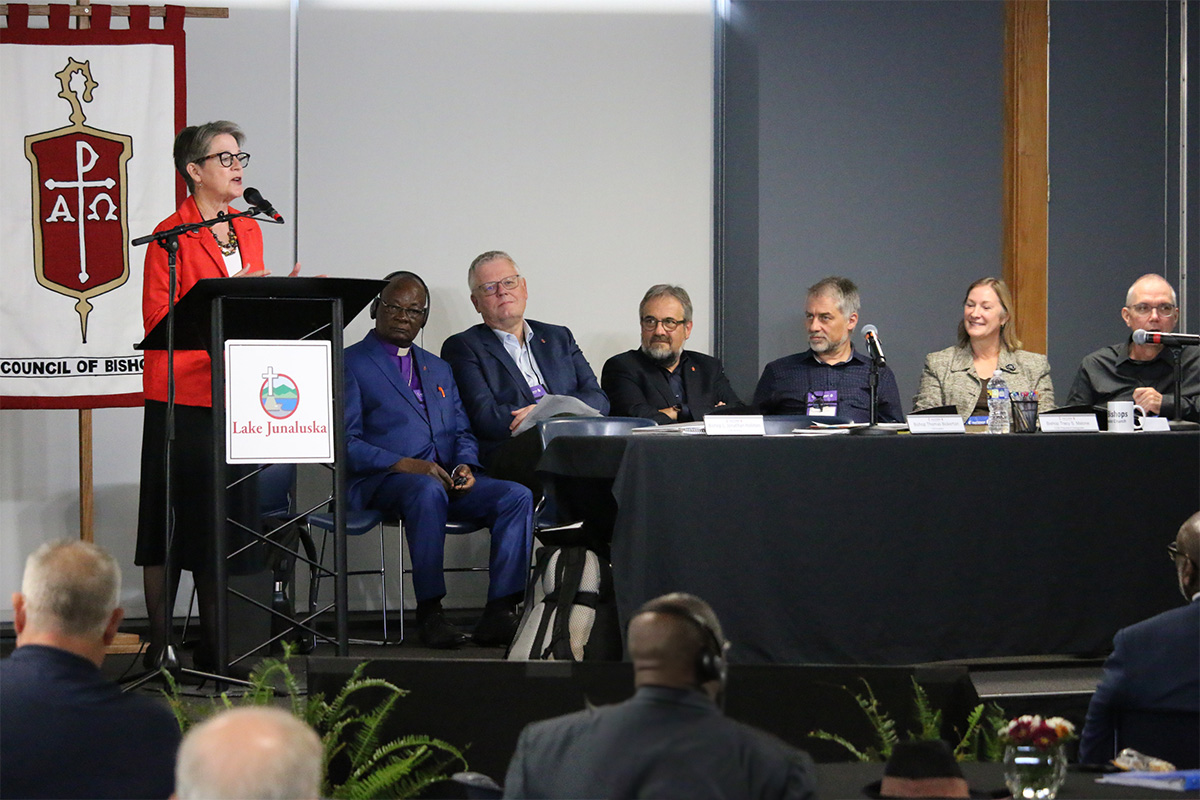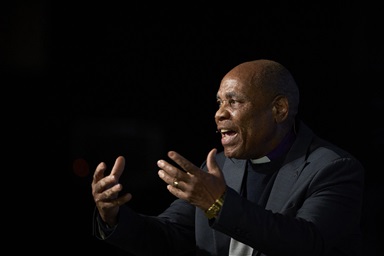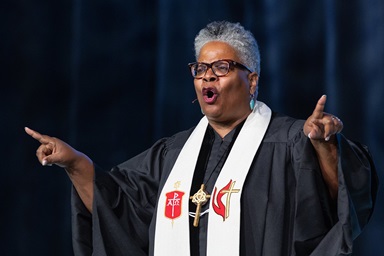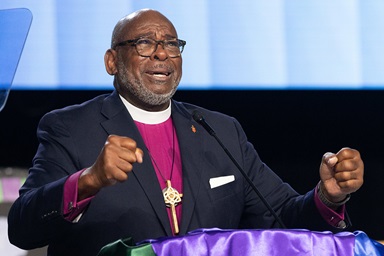Key points:
- The United Methodist Church is grappling with questions that affect its relationships with other denominations.
- Ongoing disaffiliations and the launch of a conservative, breakaway denomination pose challenges for United Methodist relations with other Methodists.
- Meanwhile, The Episcopal Church is waiting to see what The United Methodist Church’s General Conference decides before moving forward with full communion.
- At the same time, the United Methodist Council of Bishops heard about why ecumenism is crucial to ministry.
Ongoing uncertainties and a new breakaway denomination are putting a strain on The United Methodist Church’s ecumenical relationships.
During its November meeting, the Council of Bishops heard how the denomination’s situation is affecting relations within the World Methodist Council and plans for a full-communion agreement with The Episcopal Church. They also took actions intended to strengthen ties.
In addition, the bishops heard from episcopal colleagues from Africa and Europe about why ecumenism — collaboration and work toward unity with other Christians — is so important to United Methodists in the first place.
“Jesus prayed that all may be one,” explained David N. Field, a member of the Council of Bishops ecumenical staff, quoting John 17:21. “Visible unity of our churches can break down barriers and provide embodiment of the Gospel, so that the world may believe.”
What’s happening?
The word “ecumenical” derives in part from the Greek word for house, οἶκος — the basic idea being that Christians should strive to be under one roof. But at this point, The United Methodist Church is dealing with the fact that a number of congregations no longer want to be under its roof.
As of Nov. 16, more than 6,900 U.S. congregations have received the necessary approvals to disaffiliate under a church law that allows congregations to leave with property if they meet certain financial and procedural obligations. That represents nearly 23% of The United Methodist Church’s U.S. congregations departing since the provision took effect in 2019.
The departures come after decades of intensifying United Methodist debates and defiance over the denomination’s bans on same-sex marriage and “self-avowed practicing” gay clergy. But they have accelerated with last year’s launch of the breakaway theologically conservative denomination, the Global Methodist Church, that backs those bans, and the approaching expiration of the disaffiliation policy at the end of this year.
Churches in other parts of the world are either leaving The United Methodist Church or preparing to depart. Conferences — church regional bodies — in Russia, Belarus, Kyrgyzstan, Kazakhstan and the Czech Republic are in the process of becoming autonomous from The United Methodist Church.
In the meantime, proponents of the Global Methodist Church have been working to persuade churches to leave the United Methodist fold and join the new denomination instead. The Global Methodist Church says it now has more than 3,800 churches worldwide.
United Methodist bishops have denounced some of the new denomination’s recruitment tactics — which the bishops say fail to acknowledge United Methodists as fellow Christians. Leaders of the Global Methodist Church and other traditionalist groups, the Wesleyan Covenant Association and Good News, say that it's incorrect that they claim United Methodists aren't Christians.
Bishop Sally Dyck, the Council of Bishops ecumenical officer, told the bishops that the Global Methodist Church also has been approaching other Methodist denominations with which The United Methodist Church has historic ties. Dyck said the message these Methodist denominations are receiving is that they have to choose between being in relationship with The United Methodist Church and the Global Methodist Church.
Subscribe to our
e-newsletter
Keith Boyette, transitional connectional officer of the Global Methodist Church, said he has had “numerous conversations with Methodist groups around the world.”
“In every conversation, I have urged those I have spoken with to maintain their existing relationships with The United Methodist Church while inviting them to also work with the Global Methodist Church. This message is precisely what I most recently communicated in personal meetings with leaders of the Korean Methodist Church in Seoul,” he said in an email to UM News.
“Neither I nor any other Global Methodist Church staff member or leader has stated that Methodist denominations or other Christian groups around the world must choose between being in relationship with The United Methodist Church and the Global Methodist Church.”
Dyck said that as the denomination goes through these challenges, the Council of Bishops has received pledges of prayer from the Methodist Evangelical Church in Italy, which asked for prayers in return for its work with migrants.
However, she added that the United Methodist bishops received a very different message from the Methodist Church in Cuba, which was founded by Methodists in Florida and has been a longtime partner in mission. Delegates to the Cuban church’s 14th General Conference acknowledged that connection but voted to no longer affiliate with The United Methodist Church.
“And they returned the 1968 agreement between us,” Dyck said.
Increased interaction with fellow Methodist denominations “is essential,” she said.
On the recommendation of their Leadership Team on Ecumenical and Interreligious Relations, the bishops approved the creation of a task force to explore and strengthen those relationships.
World Methodist Council action
The bishops also took another action to address a concern within the World Methodist Council after the Global Methodist Church has asked for observer status within the group.
The World Methodist Council is an ecumenical body of 80 denominations around the globe that trace their roots back to John Wesley’s Methodist movement. The United Methodist Church is both the largest member and provides most of the funding for the ecumenical group, which is headquartered near where the bishops met in Lake Junaluska.
The bishops agreed to send the following response to the World Methodist Council:
“In the spirit of the values of the World Methodist Council, the Council of Bishops of The United Methodist Church encourages all requests from those applying for membership in the World Methodist Council when those applying mutually recognize all churches in the WMC as valid Christian expressions and as valid expressions of the Wesleyan Tradition.”
The Council of Bishops also asked the World Methodist Council to clarify how member churches are in communion with each other.
The Rev. Jean G. Hawxhurst, a Council of Bishops ecumenical staff member who works with the World Methodist Council, said the ecumenical group is being very thoughtful with the Global Methodist Church’s request and welcomes input.
“They are aware, they are caring, and they’re trying to do a good job with this,” Hawxhurst said.
She said the ecumenical group’s steering team will take up the request and questions about membership just ahead of the World Methodist Conference, the group’s big meeting scheduled for Aug. 13-18, 2024, in Gothenburg, Sweden.
Episcopal Church relations
Before the World Methodist Conference meets, The United Methodist Church will hold its own General Conference on April 23-May 3 in Charlotte, North Carolina. There, it will have the chance to vote on a full-communion agreement with The Episcopal Church, submitted by the Council of Bishops.
Full communion means each denomination acknowledges the other as a partner in the Christian faith, recognizes the validity of each other’s baptism and Eucharist, and commits to work together in ministry. Such an agreement also means Episcopalians and United Methodists can share clergy.
The Episcopalians have their own General Convention in June next year but they plan on delaying voting on full communion until the next General Convention in 2027. Instead, at next year’s General Convention, the plan is to vote on continuing the dialogue.
For now, The Episcopal Church is looking to see what The United Methodist Church's General Conference does with regard to various proposals, including regionalization and possible changes to restrictions on same-sex weddings and gay clergy. Many in the Episcopal Church want full communion only with denominations or portions of denominations that are LGBTQ-affirming.
The United Methodist Church already has full-communion agreements with the Evangelical Lutheran Church in America, the Uniting Church in Sweden, five historically Black Pan-Methodist denominations and the Moravian Church in North America. Each of these full-communion partners has varied teachings related to homosexuality.
Field, of the Council of Bishops ecumenical staff, provides support for the United Methodist-Episcopal dialogue.
At a meeting earlier this month, he told the bishops that representatives of The Episcopal Church expressed their solidarity with The United Methodist Church.
“Together we affirmed our commitment to the full-communion process,” he said. “The full-communion process embodies our oneness in Jesus’ heart, pledges mutual support and bears hopeful witness to a divided and broken world.”
Why ecumenism matters
East Congo Area Bishop Gabriel Yemba Unda and European Bishops Christian Alsted, Harald Rückert and Stefan Zürcher also shared the importance of ecumenism in addressing challenges in their respective regions.
Unda, who serves as the national monitor of the ecumenical group Church of Christ in Congo, spoke especially of how ties with other Christians help foster peace in his conflict-torn country.
The European bishops spoke of how ecumenism strengthens ministry, especially in areas where United Methodists are very much in the minority. Christian cooperation is helping the church minister with migrants and respond to other pressing needs in their communities.
Ecumenism is also a Methodist tradition that goes back to Wesley, who worked with and took inspiration from other Christians, such as Moravians, outside his own Church of England.
“Ecumenism is part of our Methodist identity,” said Rückert of Germany. “Ecumenism is in the DNA of us Methodists.”
Hahn is assistant news editor for UM News. Contact her at (615) 742-5470 or newsdesk@umcom.org. To read more United Methodist news, subscribe to the free Daily or Friday Digests.
Like what you're reading? Support the ministry of UM News! Your support ensures the latest denominational news, dynamic stories and informative articles will continue to connect our global community. Make a tax-deductible donation at ResourceUMC.org/GiveUMCom.




